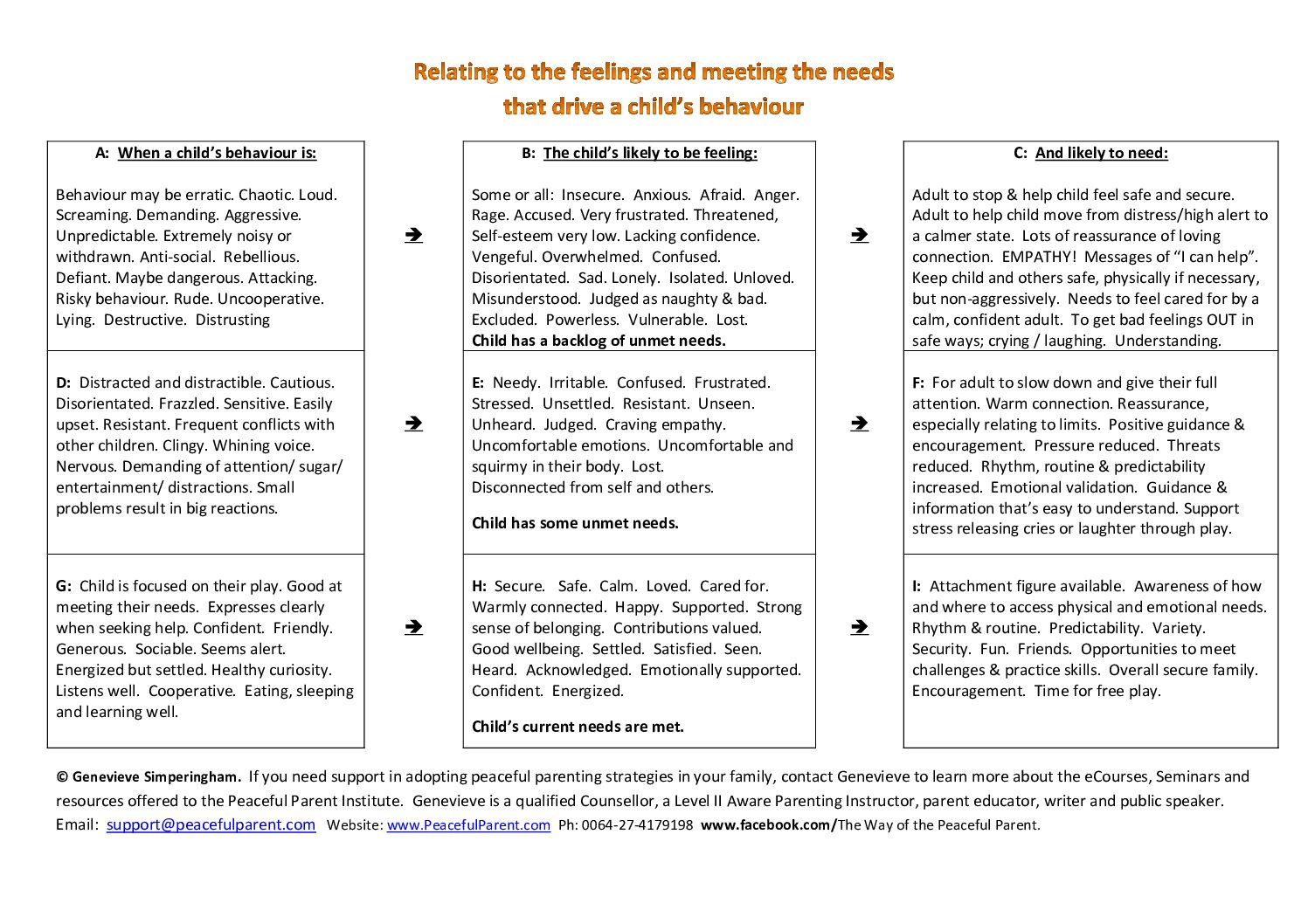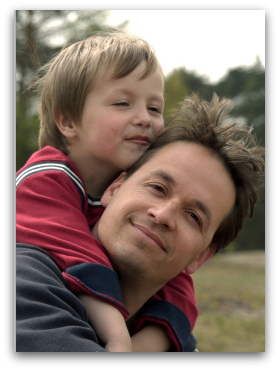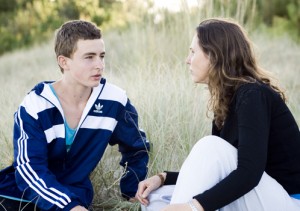 As parents, we wish for our children to grow up ready to tackle and enjoy life to the fullest.
As parents, we wish for our children to grow up ready to tackle and enjoy life to the fullest.
We want them to grow in confidence, to stand tall in their unique self, with their dignity and self-esteem intact, balanced with empathy and care for others.
The child who grows up being able to access how they really feel and to still feel ok with themselves when feeling bad has huge resilience.
As well as teaching them the social skills and all the do’s and don’ts of life, it’s so important we also support them to feel truly at peace and comfortable in themselves. At the core of peaceful parenting is the commitment to avoid shaming our children and to restore their dignity if shaming occurs. When we teach them to listen to their comfortable or uncomfortable feelings, when we patiently listen to their feelings, and when they feel safe to show their vulnerable feelings, they develop the ability to feel and follow their heart and learn to decipher what truly feels right. Sadly so many adults either didn’t develop a positive relationship with their feelings when they were young and can’t access that connection to their own, and hence other people’s feelings. We also need to model living life according to what feels right, listening to our feelings and integrity and sharing some of that with our kids.
Asking feelings focused questions:
Children benefit from the questions which help them explore their own feelings and values. Nice questions to ask can be: “how does it feel in your body when you think about each of those two options?” And for children of all ages, we direct them to notice their feelings every time we reflect the emotions that we see or imagine we’re seeing in them. We don’t always get it right when we say “you seem sad?” or “hey buddy, you look really frustrated?”, but we probably help them become a bit more aware of what they’re feeling.
And helping a child feel comfortable expressing their feelings starts from birth
We validate our baby’s feelings when we respond to their frustration with a sad sympathetic look, or reflect a wide grin and excited sounds to share their excitement at the family cat entering the room. And so this sharing and mirroring of feelings continue through their years, helping our child feel seen, known and understood. Peaceful parenting puts a lot of focus on staying tuned in to our child’s inner world of feelings, fears, hopes, dreams, insecurities, and expectations. And to do so, we pretty much need to stay in touch with our own inner world.
We want our children to feel good about the person they see in the mirror, despite the challenges they face.
It’s important to give our children positive reflections of all the beautiful qualities we see in them. And it’s arguable that many of the hardest challenges and threats to their positive self-image involve disharmony with others, especially relating to direct negative feedback from us parents. How can we maintain and model connection, dignity and respect through as many of the day to day challenges with our children as possible? Not all of them, because that may not even be possible, but as many as we can.
Our children are trying to do the hard yards of owning their mistakes and changing their ways based on the reflections of others
We know how important it is to give our children honest reflections and not neglectfully lead them to believe that they’re perfectly entitled to be rude, aggressive, demanding and insensitive. However, just as important as mirroring what’s not okay to do because it’s dangerous, aggressive, hurtful, disruptive or off track for whatever reason and why – is our reassurance that their actions do not diminish our view of them or our overall love for them.
This reassurance greatly helps a child preserve their dignity, their innocence and their positive self-image
We make it so much easier for them to learn when we somehow convey that we still care about them, and we care about what they were feeling when they did that which we struggle to accept.
If we want our children to accept more responsibility, then we want to help them both identify and work through the often painful feelings which drive their “irresponsible” behaviour.
When we deeply commit to preserving our child’s dignity and positive self-image as they learn from their challenges, it’s important to be mindful of changing our message from; “You. Have. To. Get. How. Bad this is!!” to a message of; “This isn’t okay, I’m not happy about it, AND I can see this is hard for you and I’m here to help.” The first message tends to have a shaming effect, which makes it very difficult for a child (or anyone really) to be anything other than defensive. The second is teaching with support, making it easier to own up to what needs to change or be repaired. And if you’re unsure, just imagine receiving each statement from an authority figure whose approval you depend on.
Shaming doesn’t teach our young people to take responsibility, it just teaches them to feel ashamed.
People of all ages tend to want to hide that which they feel ashamed about. We can moralize about being honest, but more effectively, it’s our job to make it truly safe for our child to own up and take responsibility. We want them to welcome our guidance and support when they break the rules, stuff up or act out. Often kids do that which they know they shouldn’t do because they were driven by big feelings, curiosity or the magnetic force of peer pressure. It’s big stuff to navigate these opposing voices and urges, most adults struggle to do the right thing, this is an ongoing journey and we want to be the one our kid can turn to when they get it wrong. Again and again.
Instead of labouring how much they’re getting it wrong, make sure they know we’re noticing the times when they get it right. It can be a hard pill to swallow but we parents need to be honest about the fact that when we get exasperated with our kids it often has a lot more to do with our mood and stress levels than our child’s behaviour! Or it’s at least a significant contributing factor.
Children can feel shame when they sense their parent can’t bear to be in the same room as them.
In reality, this is often more about the parent not being able to bear the feelings the situation has triggered. If this happens, our children need and deserve for us to do all we can to again own our own pain and stress and restore their dignity. And if I make this sound easy, I know well that it can be incredibly hard, especially when a parent is exhausted and stretched past their limits. It’s often indicative that some pressure needs to give, and more support is needed.
Imagine children growing up right from the get-go with the feeling that they’re still okay even when another in the family gets annoyed at them.
Kids need absolute clarity that when their actions (or lack of action) results in another person in the family getting upset, that they as a person are ok, still loved and accepted. They need to know without doubt that their parent still believes in them and sees their good intentions and can empathize with their striving. If your child knows the answer to be a big “yes”, then they’re well on the road to being someone who will likely to able to always return to feeling comfortable and at peace within themselves.
What happened in your family growing up when you did something that annoyed someone?
I have reflected back on whether I knew, as a child, that mistakes are an important and necessary part of learning. Not at all sadly. Could I expect acceptance and support even when I made mistakes? I think the best I could hope for was to somehow get away with it, to hope for a bigger drama going down to take my parent’s attention!
Imagine how it might have felt if (or perhaps when) as a child you received messages such as these:
“It’s okay, it’s just a mistake, no biggie!” or
“It’s okay I’ll help you fix it up”, or
“How frustrating to burn the food after putting so much work into it”, or
“I’m not happy that this got broke, it’s going to cost a lot to replace it, but I know it was an accident”,
OR “I know that it was a moment of extreme frustration for you, and what’s most important is that you know I’m here to help you learn to manage your frustrations in a healthy way” (read my article Aggression – why children lash out and what to do)
OR “I know I got really angry earlier when you threw and broke the ornament, I’m still really disappointed because it meant a lot to me, AND I’m very concerned about what caused you to feel so upset as to do this.” – Not that I, like many from my generation, would have ever, ever had the courage to express my anger so openly!
What did you learn to expect as a child?
I can imagine some of you reading noting the strong contrast between such imaginary responses in comparison to what you grew to expect as a child. Yet, it’s the message that they’re ok if when they get it wrong that empowers children to take on the weight of self-responsibility – slowly but surely.
I had a little melt-my-heart moment one day lately, which led me to reflect on this whole topic. We all sat at the dinner table, my (then) seventeen year old son had made the whole meal, yet he was looking very sad and disappointed. He apologized that the food was burnt on the bottom. His twelve year old sister quickly reassured him; “It’s okay, we all learn from our mistakes all the time. Thank you for making dinner, it looks yum!”
Yes, he was still disappointed AND his sister had helped him restore his dignity because she cared more about his feelings than the burnt food. And I believe that children develop their heart to share empathy and reassurances when they themselves gain repeated experiences in their young years of being supported to preserve their dignity when faced with mistakes, disappointments and failures – life’s challenges.
Fostering kindness amongst siblings
Other than the fact that seeing our children being really sweet to each other generally melts one’s heart, this was a moment when I really reflected on how liberating it must be for a child to truly know that making mistakes is an unavoidable and necessary part of the process of learning and growth, not a negative reflection of one’s self. And not just the little mistakes, but the really big ones that cause others to get very upset.
I had been immersed for many years in self-healing and personal development work, both personally and professionally, before becoming a parent. I was very clear about aiming to not set my children into inner conflict with themselves, to own the emotional pain that came up for me and protect them from being the recipients of my projections. I had this strong sense of wanting to preserve my child’s beauty and innocence. From the beginning of my parenting journey, I was determined not to turn my son against himself. I was acutely aware of how much work it takes to change those deeply ingrained unhealthy patterns of relating with self and others. I’ve really wanted to keep my heart open to my children no matter what happens, not necessarily in every minute of every day, but overall in each day of their lives. Sometimes this is really hard to do. I haven’t yet met a parent who doesn’t find this hard at least some of the time.
Sometimes as parents we get triggered into painful thoughts and feelings and don’t feel very caring, sometimes we do judge our child harshly and they know it and it takes all we’ve got to return back to a place where we can own our own pain and show them that we still care about their pain.
Most parents find it hard to be more kind than critical towards themselves when they struggle.
It’s a big ask to expect ourselves to generously apply tolerance, patience and support to our children through their struggles, especially if we carry an ingrained belief that we don’t ourselves deserve empathy and support when we let others down. It’s so important to develop the patience and kindness towards ourselves that we aim to give our children.
A commitment to non-punitive peaceful parenting, to bringing more empathy into your interactions in your family gifts your child with feeling more at peace in their minds and hearts more of the time. And to more easily return to peace within themselves when they stuff up, when tensions, challenges and conflicts arise.
It was the realization at age seventeen that I pretty much had NO peace of mind, that it was a horrible, scary and confusing mess in my head and heart which started me on my path to finding peace. One day when pouring it all out into my journal it hit me that maybe, just maybe, it’s possible to not just aim to appear to be at peace, but to actually live with that feeling of being at peace within myself. This idea filled me with excitement and gave me the inspiration to start looking inside and getting really real about all those messy feelings. It took a lot of courage to feel what felt too hard to feel and sharing what felt too hard to share. My eldest is eighteen at the point of writing this (2015) and seeing how overall strong, proud and at peace he and his sister are makes all the hard work of changing patterns so worthwhile.
First published in the Natural Parent Magazine, available in shops in New Zealand or Australia in 2015 but can be ordered from anywhere in the world.
Genevieve Simperingham is a Psychosynthesis Counsellor, a Parenting Instructor and coach, public speaker, human rights advocate, writer and the founder of The Peaceful Parent Institute. Check out her articles, Peaceful Parenting eCourses, forums and one-year Peaceful Parenting Instructor Training through this website or join over 90,000 followers on her Facebook page The Way of the Peaceful Parent.








